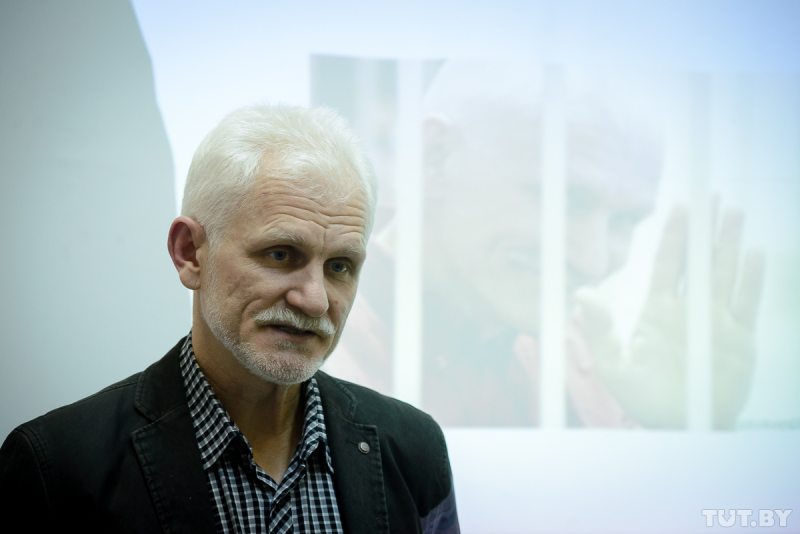Ales Bialiatski: We hope that Marieluise Beck will remain a sincere friend of Belarus
Marieluise Beck, a member of the Bundestag’s foreign policy committee representing the Greens and an expert on Eastern Europe, announced her decision not to be elected in the next convocation of the German Parliament, according to a message received by the Human Rights Center "Viasna".
In her letter, Marieluise Beck gives reasons for her decision and, summing up the "political review", outlines her position in life, which has in fact become her political creed.
“Focusing on the victims always means campaigning for human rights as well: for freedom, for security, for minorities’ rights to protection and equality, for the right to diversity, for the right to be different. This human rights policy is one of the Greens’ strongest pillars.”
Thanking her associates for their “trust and support”, Mrs. Beck says that it was thanks to them that she
“... had the opportunity to follow my beliefs, to meet with others who shared my views and thus forge friendships and justify the hopes that I have always invested in the Green Party. In some cases, we were even able to offer protection – a small gesture, given the amount of suffering there is in the world, but it made all the difference to the recipients. They included imprisoned members of the opposition in Belarus, whom I sponsored in order to improve their conditions of detention and ensure they were not forgotten.”
Ales Bialiatski was among the Belarusian political prisoners, whose fate was a matter of concern for the German MP. Viasna leader says that he could not but respond to a letter from Mrs. Beck, because he has a deep respect for her, and notes that in all the years of their acquaintance she has openly stated her position on Belarus to the country’s authorities and was the voice of the Belarusian civil society at the international arena.
“I have known Marieluise Beck for quite a long time already. She was first Head of the OSCE parliamentary group on Belarus and even then she was open and consistent in her struggle for human rights and democratic freedoms in our country. She was not afraid to talk about it to President Lukashenka and his entourage, which made her a persona non grata for some time. Mrs. Beck bold stance was noticeable on the background of the relations of foreign politicians and Belarusian institutions. But, really, when there was a political crisis in Belarus in 2010, when dozens of civil society activists were imprisoned, her voice sounded even more clearly and distinctly,” said Ales Bialiatski.
The human rights activist says that after the events of 19 December 2010, he twice met with Marieluise Beck and saw she was looking for different ways to influence the Belarusian authorities in order to release political prisoners.
“During our first meeting, she stood for diplomatic negotiations, trying to find a contact with the government to solve this problem, but in May 2011, she actually agreed that the policy of pressure on the Belarusian government through political sanctions was the last instrument that could be used by the EU to fight the gross violation of human rights in Belarus. And very soon, in August 2011, this policy brought results, 24 political prisoners were released. It also helped reveal that she was worried about what was happening in Belarus, looking for different possibilities to influence the situation: if it did not work this way — then it is worth trying a different way. And this ‘different way’ gave the result. But a certain number of political prisoners were still behind bars, and Mrs. Beck, being a member of the group on Belarus in the Council of Europe’s Parliamentary Assembly, was their public voice abroad, and, of course, her voice had international repercussions.”
Ales Bialiatski expresses his gratitude to Mrs. Beck for her support to him personally and the civil society of Belarus, in general.
“I am personally grateful for her support during my imprisonment. After all, it were the votes of individual politicians, people who were not indifferent to the situation in Belarus, that made up the position of the international community, which eventually forced the Belarusian authorities to release me, and the other political prisoners a year later. Certainly, this is thanks to Marieluise Beck. We thank her and we hope that, despite the end of her political career, she will continue to be a sincere friend of the Belarusian people.”
Marieluise Beck, member of the Alliance '90/The Greens group in the Bundestag since 1983, known as one of the most active MPs working with Eastern Europe. Since 2005, Beck has been member of the Committee on Foreign Affairs at the German parliament, where she focuses as the spokesperson on Eastern European affairs for the Green Party's parliamentary group on matters concerning Russia, Belarus and Western Balkan countries. Between 2005 and 2009, Beck also served as a member of the OSCE Parliamentary Assembly and as Deputy chairwoman of the German-Belarusian Parliamentary Friendship Group. In September 2012, Belarus denied visas for Beck and fellow parliamentarian Emanuelis Zingeris, who both planned to monitor the parliamentary elections as part of the OSCE Parliamentary Assembly mission. In 2011, she was awarded a special prize for solidarity in Belarus by the Belarusian Emigrants’ Association “for special support of human rights and opposition activists in Belarus in the aftermath of the 2010 presidential election.”



















